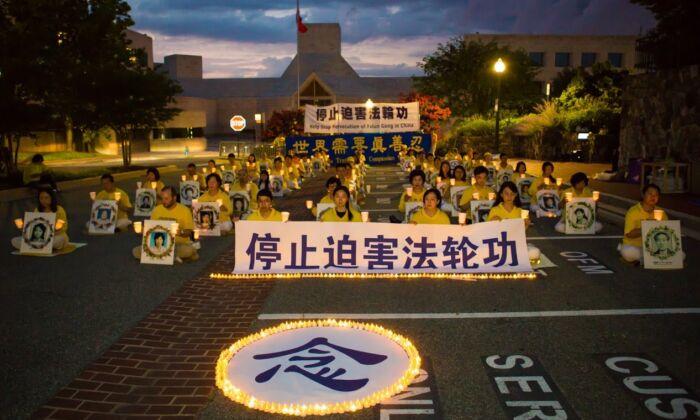UPDATED
Falun Gong practitioners wonder whether those at the top in DOS who are making China policy are not making the same mistake regarding the Chinese regime. Practitioners renounce violence in all its forms and are not interested in political power. But the Chinese Communist Party considers Falun Gong to be the greatest challenge to its rule.
Sen Nieh is professor and chair of the Department of Mechanical Engineering at Catholic University of America. He is also a Falun Gong practitioner who lives in Washington, D.C., and has often organized academic forums about the persecution of Falun Gong.
“I think they truly don’t know what we’re about, what we want, or what drives us. If you asked these very basic questions, I really don’t think the State Department could answer them,” Nieh said.
“And that’s alarming because Falun Gong is so central to the Chinese regime’s foreign and domestic policy. We’re trying to engage this regime without really understanding such a crucial issue.”
Nation Transformed
Falun Gong, also known as Falun Dafa, is a spiritual discipline that involves practicing five meditative exercises and living according to the principles of truthfulness, compassion, and tolerance. After Mr. Li Hongzhi began teaching the practice publicly in 1992, it rapidly became very popular in China.
Nieh says that DOS officials, if they want to understand China, need to understand how a formerly atheist nation was transformed in seven short years.
In a February 1999 article, U.S. News and World Report quoted a Chinese Sports Commission official who indicated 100 million Chinese had taken up the practice. A Shanghai TV station also reported in early 1999 there were 100 million practitioners.
That is one in every 13 Chinese—or one-third the population of the United States.
The nation’s embrace of Falun Gong was seemingly spontaneous—no advertising was used to spread the practice. It spread by word of mouth, and trickles of popularity in areas that Mr. Li visited quickly deepened and widened.
No region of the nation was left untouched, and no layer of society left out. Illiterate farmers began practicing, as did the rich and the powerful. Sources inside China say that the wives of seven of the nine-member Politburo—the committee that stands at the top of the Chinese Communist Party (CCP)—practiced Falun Gong. So, too, did a number of governors and mayors throughout China.
Various governmental bodies gave awards to Falun Gong, including, ironically enough, a foundation run by the Public Security Bureau.
War Against the Chinese People
Nieh believes the U.S. government needs to understand why the issue of Falun Gong is the issue of greatest importance to the CCP and how much the Chinese regime fears this peaceful practice.
That fear, according to the Falun Dafa Information Center (FDIC), led then-paramount leader Jiang Zemin in July 1999 to order the practice of Falun Gong be “eradicated,” which remains the official policy of the CCP.
“The resources the CCP has poured into making war on the Chinese people are huge,” Nieh said. “Why would the CCP waste the nation’s money in forcing people who simply want to become better to give up their beliefs?”
In June 1999, Jiang set up an extra-constitutional agency called the 610 Office. Its purpose is to carry out the persecution of Falun Gong. With offices at every level of the Party and government in China and seemingly unlimited resources, it has organized a systematic, comprehensive, and brutal effort to identify and “transform”—a euphemism for torturing someone to renounce his or her beliefs—every Falun Gong practitioner in China.
The CCP’s mammoth Golden Shield Internet project—more commonly known as the Great Firewall of China—targets Falun Gong. Studies have shown the most-heavily censored terms are those relating to Falun Gong.
The CCP has also arrested large numbers of practitioners. The independent scholar Ethan Gutmann estimates 450,000 to 1 million practitioners are detained in China at any one time. International observers, as quoted in human rights reports, have claimed that one-half of those detained in the Chinese regime’s vast labor camp system are Falun Gong.
According to the U.N. Special Rapporteur on Torture, two-thirds of the reports of torture are of Falun Gong practitioners. FDIC confirms over 3,000 practitioners have died from torture and abuse but estimates the actual death toll is in the tens of thousands.
Falun Gong practitioners have also been killed by having their organs removed. In their book “Bloody Harvest,” former Canadian secretary of state (Asia-Pacific) David Kilgour and international human rights lawyer David Matas state that since 2000, 42,000 transplantation operations have occurred for which the CCP cannot provide a source for the organs. They believe the most likely source is detained Falun Gong practitioners.
Next: False Friends
False Friends
DOS might begin to understand these dramatic events by talking with Falun Gong practitioners.
Nieh says, “In Washington, D.C., we have a number of Chinese practitioners who are experts in various fields. We also have a large community of Westerners who practice Falun Gong. Practitioners do the Falun Gong exercises on the National Mall regularly. We are easy to find.”
Might DOS be relying on other sources?
Erping Zhang, the spokesperson for FDIC, is concerned DOS officials may have been subjected to a disinformation campaign conducted by Chinese authorities. He pointed to an email recently sent to a U.S. senator’s office that claimed to be from Zhang. The email made irrational statements and demands.
An IT expert was able to show that this fraudulent email originated from an IP address in mainland China.
“We have seen this kind of email—in which someone claims to represent Falun Gong and then writes irrationally in order to discredit Falun Gong—many times in the last few years. I would not be surprised if other congressional offices and the State Department also received these emails,” Zhang said.
Heng He is an expert on the CCP and writes commentary regularly for The Epoch Times. He says that the CCP is very skilled at influencing government officials through the use of united-front tactics—having individuals or groups in society not formally related to the CCP advance its interests.
“The typical practice of the CCP is to have Chinese who are loyal to the Party cultivate friendships with government officials. The officials think they are dealing with independent individuals and go to their ‘friends’ for advice about China issues. Those friends can be counted on to steer the government officials’ thinking in the Party’s direction,” Heng said.
Chen Yonglin, the former consul for political affairs for the Chinese Consulate in Sydney who defected in 2005, testified before the U.S. House of Representatives Committee on International Relations that his consulate often used “friends” to deliver information to Australian government officials.
Heng pointed to an article published by a research group of the Xinhua News Agency as an example of how the CCP uses friendship to influence the opinions of VIPs so that they will disseminate the CCP’s views.
That article says: “The main targets of foreign propaganda should be the middle and upper class in the target countries, including politicians, people in business circles, and intellectuals because they control either the political or the economic power and have the influence on the ideology and public opinion of those countries. …
“Especially, we should make friends with the famous people in foreign media. We should have an intimate relationship with them and do well the work of foreign propaganda with their help.”
The Xinhua correspondents who use friendship as a propaganda tool are obviously employees of the CCP. Heng says that in capitals around the world, the “friends” who approach government officials often have no obvious ties to the CCP.
Nieh says: “The persecution of Falun Gong in China tests the imagination and the character of State Department officials. The United States was founded by individuals fleeing religious persecution, and the Falun Gong issue should be very easy for Americans to understand. Yet in the face of such a huge atrocity, the State Department has chosen to meet with the torturers and the murderers, while refusing to take a stand against the persecution.
“In the past 10 years, those who make China policy at the State Department have never contacted us—never contacted a single one of us. The persecution of Falun Gong is a fundamental moral challenge everyone has to face. Everyone has to answer for how they respond to it.”
Correction: In the original version of this article, Ethan Gutmann was cited as saying “2 million” Falun Gong practitioners are detained in China at any one time. This should have read “450,000 to 1 million.” The Epoch Times regrets the error.








Friends Read Free